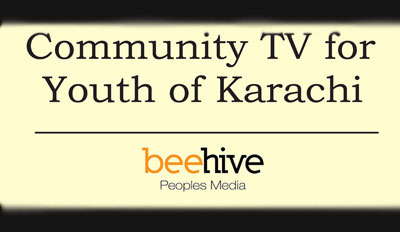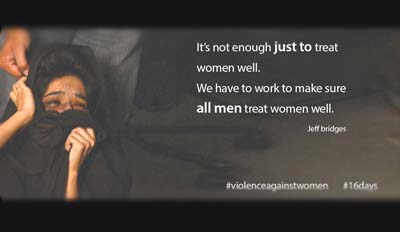Quashing Theories
Kaukab Shairani
‘Only 5% of the population of Pakistan gains tertiary level education,’ said Wasif Rizvi, CEO of Habib University, in conversation with Ishrat Hussain, Talib Syed Karim, Shahnaz Wazir Ali and Mehtab S. Karim on the importance of post graduate and PhD programs in Pakistan.Pakistan holds only 5.2% of the total tertiary education globally, and 10% by HEC's estimate. Rizvi thinks that this is not due to the presence of private higher education rather how less such notable institutions exist in Pakistan. ‘A top tier private educational university is a unique organization that are in deficit in the entire world,’ said Rizvi who strongly emphasized the need of Pakistani’s to embrace this private enterprise in their societies to keep them going. ‘There are 160 universities in Pakistan but there quality leaves a lot to be desired for,’ said Talib S. Karim. He too put his weight behind private sector universities, said that these institutes represent a successful model, working without donations and hiring teachers at their will, providing a better quality of education which can be gauged in terms of knowledge given to the graduates.
Dr. Ishrat Hussain asked whether people generally agree that private sector universities are meant for the elite. He responded that though it is true universities like AKU, Habib, LUMS, and IBA do provide for students coming from niche backgrounds, all these universities also extend financial support to those candidates with prospects of social return of investment, since that is what really matters. He solemnly agreed, it is important that a certain percentage of students are required to pay the full fee since only then the institute can maintain a donnish faculty. He concluded his chat with an attempt to debunk any myths of elitist schools. He found the argument not well grounded enough since the financial support extended to students even includes lodging and boarding.
Dr Mehtab S. Karim stated that ‘only a person with the understanding of liberal arts becomes a thinker. People with a medicine or engineering degree aren't generally thinkers.’ Rizvi agreed to her theory. ‘How can a man know who he is without having a humanities background?’ He even thought out loudly how Al Qaeda, when came into being, highlighted that Pakistan doesn't have a humanities school. Hence liberal art courses are mandatory for all students of his university as he realized it is imperative that students be given lessons on human experiences.
Rizvi also stated that top universities in Karachi such as IOBM, IBA and SZABIST have to have some engagement with the elite too, because if top tier universities don't do that, it causes elites to send their children abroad for tertiary education. A question from an audience was raised to the speakers about how do they justify the falling quality of education in Pakistan? Dr. Ishrat Hussain answered that he disagrees since now, there are better universities and more in number than there were 20 years ago, enabling graduates to find jobs much quickly than usual. However, he opposed the formation of private medical colleges.
Contemporary Fiction
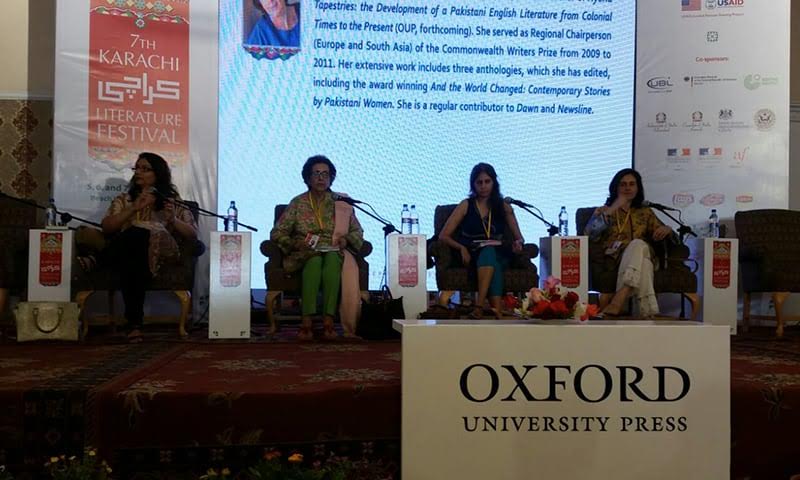
Khazima Munaf
The session of SA Fiction was a thought-provoking gathering. Though it was the second session of the day, it managed rooting its attendees through an hour long chat.Kamila Shamsie spoke over writing as mythmaking. She began with bringing to attention how fiction writers seem more fascinated by ‘myths of the future’ while handling myths of the past. She felt that post-colonial writers might be re-making language while carrying their colonial pasts.
Most interestingly the conversation shifted to a commentary over gender when it was discussed how the written word is still associated with man-made-accounts. Shamsie pointed out that women continue being associated with oral narratives and man with the written because they continue enjoying precedence in education departments and other important fields. "In recording, the voices of women get erased because its the men writing the history,” says Bina Shah over the topic. Ending the conversation on a positive note, Shah praised how women like Shamsie,Khan and herself are fighting this ‘erasure’ through their writings and also through the oral narrative, KLF being case in point.
What keeps us apart? India-Pakistan Relations
Frayan Doctor
The most significant and interesting talk since 68 years in our region has been India- Pakistan Relations. The question raised this time was ‘what keeps the two (countries) apart?’With some prominent personalities in the discussion, Ambassador Marker stated, "It takes 5 minutes to break diplomatic relations with a country, but a whole lot longer to sustain them." Salman Khurshid, the Indian politician and former cabinet member said peaceful existence and relations between the two is a matter of personal chemistry between leaders, which requires balance from both sides, but has disappeared because the people left (reference to partition). Hina Rabbani, former Foreign Minister of Pakistan, joined in saying peaceful coexistence for Pakistan and India cannot be achieved because, agreeing with Khurshid, the partition episode is indelible. The centuries old unity of the people meant that upon Partition, the 2 became arch enemies. And then our Media plays another major role in hyping tensions. She further affirmed that keeping in mind Pakistan’s history of martial laws, the civilian institution is weaker than military. Though military is not trained in foreign policy matters, but the Pak military is different. Only if the civilian apparatus has faith in its own workings, it can become stronger. She highlighted the role of Pak military has been decreasing while the Indian military is increasing. Power of information is paramount, the Pakistani politician Khurshid Kasuri said. In its absence, no foreign policy can be framed. Even any military needs information from the world over to draw up foreign policies.
The panel then brings out how vital a role the common men on either sides of the border can play in bringing about peace. Khurshid believes that both countries should be patient and work consistently to achieve lasting peace and this spirit is found in both countries. Politicians should take a backseat, and the people should work out ways to develop lasting peace. Rabbani says she doesn't have the patience to wait another 70 years for lasting peace. It takes either a small or large incident to set back progress. The 2 countries have never been able to agree to solve any dispute. A deep seeded change is needed in both societies. Our children need to be taught more than just the problems that led to partition and have information on the unity both Muslims and Hindus enjoyed in an undivided subcontinent. Kasuri stressed the need of strong leadership is needed to derail terrorist efforts to disrupt potential peace and strong ties.
The moderator, Aijazuddin said there is institutionalized ignorance on both sides. But in India, people know more about Islam, generally, than Pakistanis know about Hinduism and Sikhism. Khurshid proposed that interfaith and otherwise extensive and determined dialogues between the youth on both sides can end this form of ignorance. Within a decade, remarkable changes can be achieved if the young generations come together to solve problems domestically and between the 2 countries. He said the youth of both countries should win the peace prize if peace is achieved through their efforts. Rabbani agrees with Khurshid and suggests school and college students should be given visa free entries to hold dialogues. The liberal visa regime in the past saw people from both sides unite under the sporting banner of cricket. Marker concluded increase in contact among the common people of both the countries can reduce the trust deficits.
It was the perfect way to conclude the festival. There was for this talk. The in depth and conclusive analysis by the panelists on how to bring about lasting peace in the region grabbed a huge audience comprising of both young and old. A lot of people raised relevant questions and the audience repeatedly applauded the panelists for their esteemed input on the subject.
In conversation With Barkha Dutt

Khazima Munaf
The launch of Barkha Dutt’s ‘The Unquiet Land’ served as an interesting conversation on India and our current relations with the nation through the writer’s eyes.It kicked off as a general commentary on the book where Barkha discussed the discrimination and violence the women in our society suffers from. The 1st chapter of her book is a commentary on it and the various means through which women are shuttered and silenced, where she even shared her personal experiences so as to not come off hypocritical. But as anticipated the discussion shifted course to contemporary politics between the two nations very quickly. According to Barkha, due to their knack of over doing things, both the nations face dysfunctional-ity. She spoke candidly over politicians and leaders from both ends and did not shy away at defending the stance of her country’s on certain sticky matters, read terrorism and Kashmir.
When asked about the growth of radicalism apparent in the Indian community, Barkha swiftly denied drawing parallels between the situation in India and Pakistan, saying that here the societies differ too much to be coalesced as the same. She strongly believes in the democratic traditions of her country that has nourished and empowered their civil society that may bring an extremist like Modi to power but will not stand him sidestepping the might and opinions of the masses.
In response to actions of Shiv Sena, Barkha refused to acknowledge leaders of both the nations as true representatives of states that are immensely diverse in their nomenclature. According to her, Kashmir is no more what ails the relations of the two neighbors anymore, its state backed terrorism that is straining both the parties.
The Official Status of Urdu
Madiha Munaf
There were quite a few sessions on Urdu, discussing its status in Pakistani society, its transitions from columns to even what role a mother tongue plays in the education, both formal and informal. The most interesting debates turned up in ‘Mother Tongue: Medium of Instruction and learning’ and ‘Sarkari Urdu, Awami Urdu; The Official Status of Urdu.’The panelists of the former advocated the dominance of English, keeping in mind the role it plays as the lingua franca in this age. Chaudhry Faisal, Pakistani academician, school practitioner and a social entrepreneur, said he wouldn’t sponsor English as the medium of instruction but people need to link it with employability factors worldwide to understand how important proficiency in this ‘currency’ is. He tried to clear any misunderstanding on his behalf and advocated promotion and protection of regional and mother languages in schools.
Whereas the other discussion discussing the official status of urdu lamented its social standing in the society. Arifa Sayed pointed out that Urdu has enjoyed an unfortunate status in Pakistan since the partition due to the colonial mindsets of people which give precedence to any and everything enjoyed by their colonial masters. ‘Nobody is willing to own it,’ said Arifa when she explained how its neither the language of the nation nor the state’s. She criticized how our leaders struggle with giving speeches in English but persevere when there are translators in such international gatherings.
Fatema Hassan proudly acknowledged that she had studied from a government school (peela school she said) where only English language was taught in that language and the rest were in Urdu. She critiqued how during her times it was taught so well that she may not be a fluent speaker but an able writer.`Nasir Abbas Nayyer assessed that the entire problem laid with the currently flawed education system that is neither delivering quality tutelage nor refining students culturally.
The responses from people were equally interesting. While these were a humbling sessions, the reactions varied. Some objected to how English is stressed by state policies and even asked Barbara Toye-Welsh, who is working in Sindh from USAID, that she should have workers fluent in Sindhi to help in the area, meaning they respect their cultural underpinnings rather try and suppress them.
Overall, a large gathering of people enjoyed the conversations and engaged in invigorating discussions.
Transgender Dilemma

Alice Peter
The Transgender’s Dilemma kicked off with so far the largest audience in the main garden of Beach Luxury Hotel. Laxmi Narayan Tripathi, a transgender’s rights activist from India, who is also highly educated and well versed in all policies of the UN and WHO, sits draped in a red sari. Her red lipstick that is often viewed as an objectification element for women does nothing on her courage and bravery in speaking for her rights.Arifa Syeda Zehra calls the third gender community, the “ISI” of the Mughals. She pointed out how Khwaja Sarhas were allowed both in the Queen’s castle and the Kings’ too, so why speak against their morality now? It is rather surprising that such a huge audience sits here, listening to this transgender when they shoo this community every day at the signals. Laxmi spoke about how transgender are kicked out of their homes once their sexuality and sexual preferences start taking surface. They drape saris which is a source of embarrassment to their parents. These children on streets are considered as those who cannot raise families and are accorded no respect in the society and eventually raped on streets.
“Hij ke baghair Hijra nahi.” says Laxmi, “I enjoys nature’s femininity. The meaning of Hijra is– I leave my home to find my own self. Kia sirf dunya se badla lene ke liye aapne apne aapko badla?”
Both Pakistan and India have completely sidelined their third gender, Laxmi pointed out. Why disown your own kids? Laxmi’s father accepted her for what she was however now Laxmi wonders that dilemma of those parents who give birth to the Transgender is greater than that of the community.
The language we use with this community is very important. Not only are they already marginalized in society but they are now called the Khwaja Sarha which means they have now been banished from the culture itself. Hence, Laxmi wants to be known as Khwaja Sarha or Hijra because that makes them feel part of the culture they have shared for ages at least.
The language we use with this community is very important. Not only are they already marginalized in society but they are now called the Khwaja Sarha which means they have now been banished from the culture itself. Hence, Laxmi wants to be known as Khwaja Sarha or Hijra because that makes them feel part of the culture they have shared for ages at least.
Women are not taught to love themselves. Woman forget that womanhood is so powerful that patriarchy bends to her. Laxmi loves herself for who she is and she displayed that confidence in herself when applied lip gloss in front of hundreds of people, not caring what anyone thought of her.
“Aap munkir nakeer mat banye.” says Laxmi. That is what we say to those who interfere in other people’s lives as long as things are consensual, stop meddling. “We are all equal according to our constitution… but what about justice? It’s not accessible by all.”
Despite the huge turnout for the session, many seem to be only there for entertainment and not for the controversy. Very few among them for LGBT rights as they sit here laughing away at Laxmi’s dark humor.
Nobody has the right to medically or any other way, decide my gender, says Laxmi. It took humans years after experimentation, that this is no disease, children are born this way.
KLF remembers Intizar
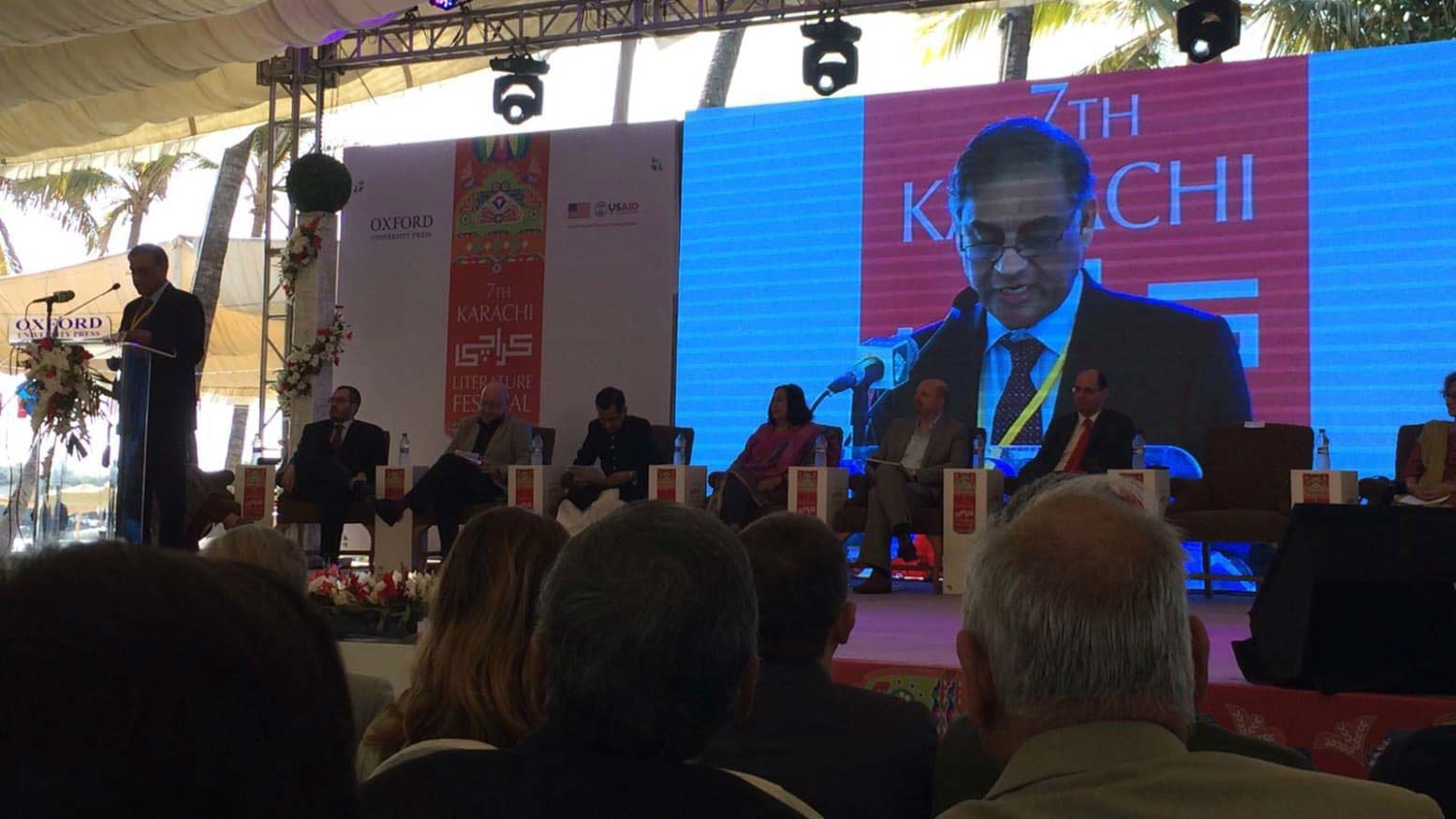
This year’s Karachi Literature Festival kicked off with remembering what we all would miss: the biggest literary giant that we lost this year, Intizar Hussain, who passed away on February 2. The opening session observed a minute of silence in remembrance. As co-founder of the KLF, Dr Asif Farrukhi, said in his speech, "Intizar Hussain had become the father of all literature festivals.".
Two dance performances, one by Amna Mawaz Khan and another by Mani Chao’s dance troupe, followed, all part of the opening session. KLF Awards were also handed out to this year’s winners in this session.
Inthikab e Kalam
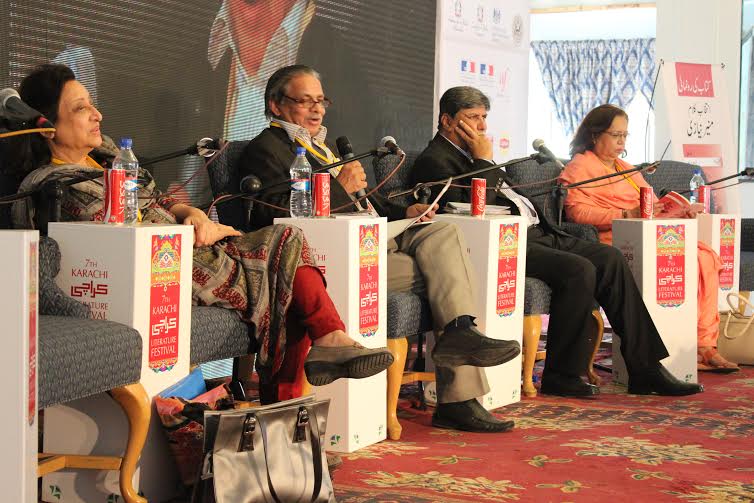
Hina Javed, Sana Chaudhry
The book launch of Munir Niazi’s ‘Intikhab e Kalam’ kicked off with a decent turn out, consisting of mainly the elderly. The moderator, Mujahid Barelvi, begins with commending Niazi’s labor at Indus TV and his print work fondly. Panelist Fatema Hassan appraised the book and the writer, too, saying "Koi shair faltu nai lagta. Koi nazm bekar nai jari. Sab ehem hotay hain apni jaga."Asghar Nadeem Syed, popular TV playwright and a short story writer who also writes for Pakistan Herald, also pitched in his two cents when he commented that he only knows two writers who wore crisp white kurta shalwar, Ghalib and Niazi. He further drew parallels between Niazi and the late Intezzar Hassan’s work due to their political commentaries. His relevance is highlighted by how his poetry demonstrates anything concerning martial law in Pakistan.
Fahmida Riaz, Pakistan’s famous Urdu writer and poet, recounted how Niazi thought that women don't write poetry, poetry is written about them/on them. She reminisced how to refute his claim she had written him a shair in his own style. What began after that set the mood of the gathering. Fahmida would recite a shair and it would be followed by other panelists, ranging from issues of spirituality in different eras. She even pointed out the symbolic importance of snake in Niazi’s poems and emphasized the individuality of a writer that raises their word to a thought in a certain manner. She is respected and admired for her originality, her aesthetic excellence, her candour, and she is even credited for opening new vistas in Urdu literature.
"Chahta ho mein munir is umar ke injaaam par, ek aisi zindagi jis mein mein pareshaan na hun", recited Asghar Syed. He further explained the abundance of symbolic expressions, like snake and rain, in Niazi’s work. He concluded the talk with stating his uneasiness at how contemporary poets seem now done with the discipline of poetry of the past and have become mere entertainers, flouting art as joke.
During the Q/A session, many topics emerged for discussion such as how currently a new phase is beginning where Urdu is transforming, parsi is diminishing and Hindi is blooming.
Fahmida stressed on the individuality of poets and how different their trains of thoughts are. They hardly agree on the same things, she said. Mujahid, along with the rest of the panelists, recited their favourite excerpts out of the book being launched of Niazi.
The launch concluded with a standing ovation in respect of Munir Niazi’s contribution to Urdu poetry. By the end, the show hosted many people, some standing at the back to enjoy the discussions and poetry recited by the panelists.
